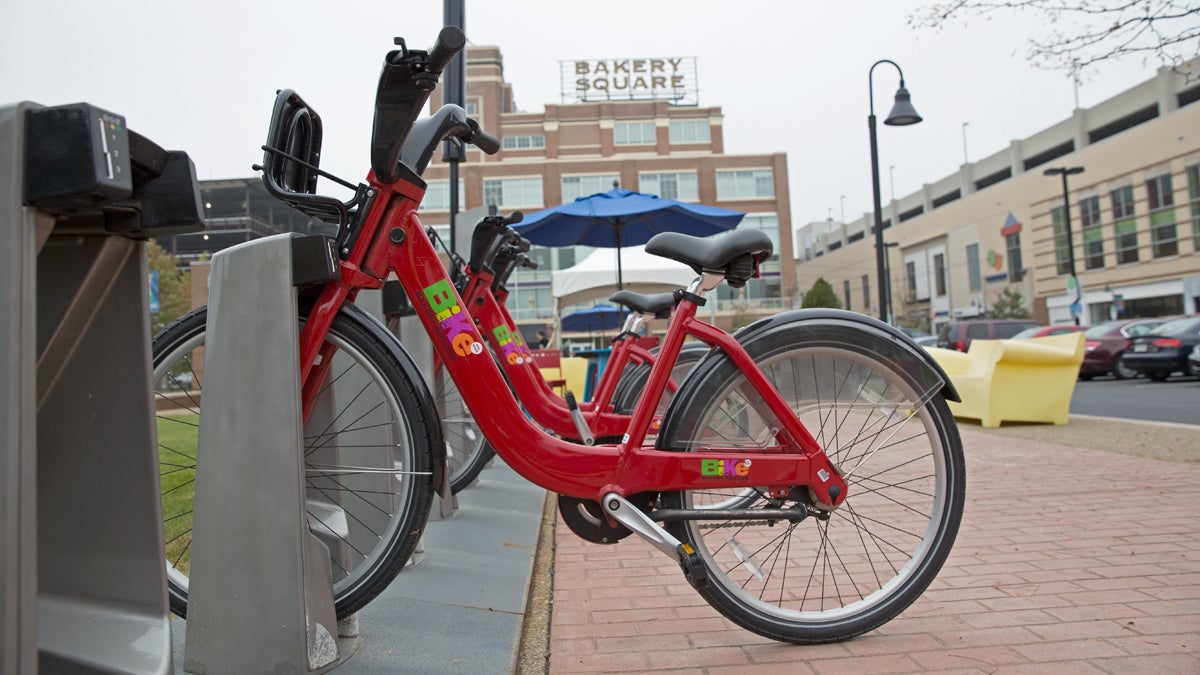Joe Nickol on bikeshares, complete streets, and Pittsburgh’s obsession with parking

This bikeshare station in the Bakery Square section of Pittsburgh, Pennsylvania is limited to Google employees and Carnegie Mellon University students. Pittsburgh hopes to establish a citywide bikeshare program open to all in 2015. (Lindsay Lazarski/WHYY)
Joe Nickol is an associate principal with Urban Design Associates, an urban design and architecture firm based in Pittsburgh.
“Five Questions with…” is a regular Keystone Crossroads feature where we seek to glean wisdom and ideas from some of Pennsylvania’s top urban thinkers and doers. Joe Nickol is an associate principal with Urban Design Associates, an urban design and architecture firm based in Pittsburgh.
Q: Tell us about an amenity or service that you’ve seen in your travels to other places that you wish you could bring back to your city/community?
A: Bikeshare. The two bike share programs I’ve used the most are Chattanooga’s and Montreal’s. They are run by two different companies but are easy to use and have supporting bike infrastructure to make it a great experience. Montreal’s organization has struggled a bit as they try to find a financial model that works for them but the end result for the user is working well. The degree to which public entities should participate in the operations of this great service is an ongoing debate. Certainly, towns and cities should be implementing safe streets that bicyclists of all experience levels feel like first class citizens.
Q: What’s one urban improvement idea that you could categorize as “nice try but didn’t work”?
A: Complete Streets. They’re well intentioned and advertised as the safest, “greenest” solution to infrastructure with a place for everybody and putting everyone in their place. In reality, these have been too expensive, too big, too fast, and lack the qualities that provide sufficient return on investment in terms of safety, activity, livability, etc.
Q: Describe a person in your community who is a “spark” — someone who seems to get things done and inspire people. (This does not need to be an elected official.)
A: David Lewis in Homestead, Pa. He is the founder of our firm and, even at 94 years of age, putting meaningful imprint on the communities he touches. David Lewis and his family recently opened Tin Front Cafe as a neighborhood anchor in Homestead and is actively engaged in trying to bring 8th Avenue back to life. His wife Judy runs the kitchen store next door. Both through these commercial ventures and through David’s sculpture that animates the courtyard and store fronts, his work demonstrates the power of big ideas in small spaces.
Q: What flaw or habit does your city/community have that you would like to see it change?
A: It is too concerned about parking. Pittsburgh is a wonderfully bikeable, walkable place. Adding more parking only induces more driving. We have plenty of places to stick a car.
Q: Tell us about a movie or book that depicts, in a way that grabbed your attention, how a city can thrive or fail.
A: I recently finished Vishaan Chakrabarti’s A Country of Cities. His analysis, graphics, and wonderfully clear writing style describes the elements of a thriving and prosperous metropolis. Unfortunately, his recommendations and vision lead to results that we know are too impractical, unlivable, unaffordable and unadaptable to be useful in a constantly changing world.
WHYY is your source for fact-based, in-depth journalism and information. As a nonprofit organization, we rely on financial support from readers like you. Please give today.


